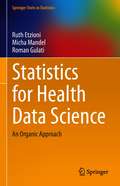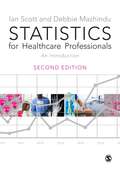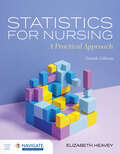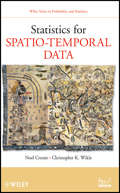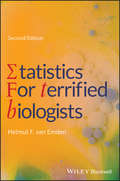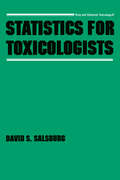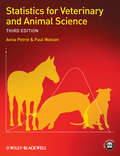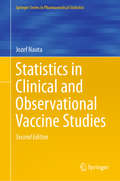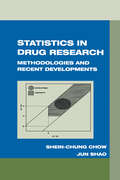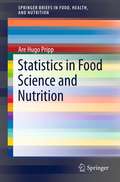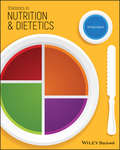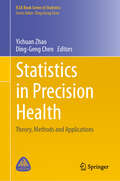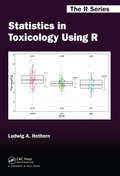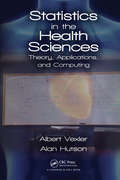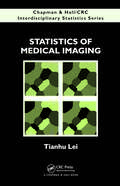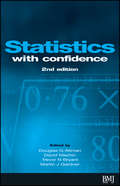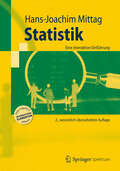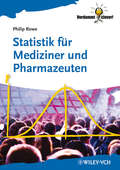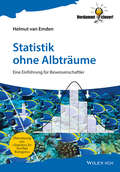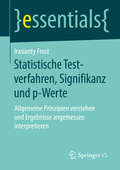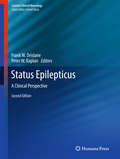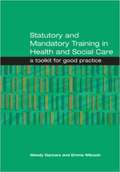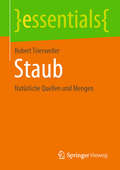- Table View
- List View
Statistics for Health Data Science: An Organic Approach (Springer Texts in Statistics)
by Ruth Etzioni Micha Mandel Roman GulatiStudents and researchers in the health sciences are faced with greater opportunity and challenge than ever before. The opportunity stems from the explosion in publicly available data that simultaneously informs and inspires new avenues of investigation. The challenge is that the analytic tools required go far beyond the standard methods and models of basic statistics. This textbook aims to equip health care researchers with the most important elements of a modern health analytics toolkit, drawing from the fields of statistics, health econometrics, and data science. This textbook is designed to overcome students’ anxiety about data and statistics and to help them to become confident users of appropriate analytic methods for health care research studies. Methods are presented organically, with new material building naturally on what has come before. Each technique is motivated by a topical research question, explained in non-technical terms, and accompanied by engaging explanations and examples. In this way, the authors cultivate a deep (“organic”) understanding of a range of analytic techniques, their assumptions and data requirements, and their advantages and limitations. They illustrate all lessons via analyses of real data from a variety of publicly available databases, addressing relevant research questions and comparing findings to those of published studies. Ultimately, this textbook is designed to cultivate health services researchers that are thoughtful and well informed about health data science, rather than data analysts. This textbook differs from the competition in its unique blend of methods and its determination to ensure that readers gain an understanding of how, when, and why to apply them. It provides the public health researcher with a way to think analytically about scientific questions, and it offers well-founded guidance for pairing data with methods for valid analysis. Readers should feel emboldened to tackle analysis of real public datasets using traditional statistical models, health econometrics methods, and even predictive algorithms. Accompanying code and data sets are provided in an author site: https://roman-gulati.github.io/statistics-for-health-data-science/
Statistics for Healthcare Professionals: An Introduction
by Ian Scott Deborah MazhinduThis book introduces you to the basic rules and principles of statistics and shows you how straightforward statistical tests can be performed and analysed in relation to healthcare. Key features of the text are: -Examples which show how statistics are used in the real world -Exercises to test your understanding and develop your proficiency -A glossary to remind you of key terms. -Additional online material including guides to using Microsoft Excel and SPSS and sample datasets.
Statistics for Nursing: A Practical Approach
by Elizabeth HeaveyNurses are leveraging new technologies to interpret and analyze clinical data. Understanding how to use that information and make appropriate clinical decisions are vital to their role and proper patient care. Statistics for Nursing: A Practical Approach, Fourth Edition presents the complicated topic of statistics in an understandable manner, so students are prepared to start their career no matter the setting. Relevant clinical examples followed by end of chapter application exercises, provide students the opportunity to practice statistics while learning. The Fourth Edition introduces Intellectus Statistics, a web-based statistical software program designed to help non-statisticians learn to conduct research and complete statistical analyses appropriately. Often, computer applications are the most stressful part of learning statistics. This program simplifies the process of learning the software while helping students produce and understand the actual statistics content.
Statistics for Spatio-Temporal Data
by Noel Cressie Christopher K. WikleWinner of the 2013 DeGroot Prize. A state-of-the-art presentation of spatio-temporal processes, bridging classic ideas with modern hierarchical statistical modeling concepts and the latest computational methods Noel Cressie and Christopher K. Wikle, are also winners of the 2011 PROSE Award in the Mathematics category, for the book "Statistics for Spatio-Temporal Data" (2011), published by John Wiley and Sons. (The PROSE awards, for Professional and Scholarly Excellence, are given by the Association of American Publishers, the national trade association of the US book publishing industry. ) Statistics for Spatio-Temporal Data has now been reprinted with small corrections to the text and the bibliography. The overall content and pagination of the new printing remains the same; the difference comes in the form of corrections to typographical errors, editing of incomplete and missing references, and some updated spatio-temporal interpretations. From understanding environmental processes and climate trends to developing new technologies for mapping public-health data and the spread of invasive-species, there is a high demand for statistical analyses of data that take spatial, temporal, and spatio-temporal information into account. Statistics for Spatio-Temporal Data presents a systematic approach to key quantitative techniques that incorporate the latest advances in statistical computing as well as hierarchical, particularly Bayesian, statistical modeling, with an emphasis on dynamical spatio-temporal models. Cressie and Wikle supply a unique presentation that incorporates ideas from the areas of time series and spatial statistics as well as stochastic processes. Beginning with separate treatments of temporal data and spatial data, the book combines these concepts to discuss spatio-temporal statistical methods for understanding complex processes. Topics of coverage include: Exploratory methods for spatio-temporal data, including visualization, spectral analysis, empirical orthogonal function analysis, and LISAs Spatio-temporal covariance functions, spatio-temporal kriging, and time series of spatial processes Development of hierarchical dynamical spatio-temporal models (DSTMs), with discussion of linear and nonlinear DSTMs and computational algorithms for their implementation Quantifying and exploring spatio-temporal variability in scientific applications, including case studies based on real-world environmental data Throughout the book, interesting applications demonstrate the relevance of the presented concepts. Vivid, full-color graphics emphasize the visual nature of the topic, and a related FTP site contains supplementary material. Statistics for Spatio-Temporal Data is an excellent book for a graduate-level course on spatio-temporal statistics. It is also a valuable reference for researchers and practitioners in the fields of applied mathematics, engineering, and the environmental and health sciences.
Statistics for Terrified Biologists
by Helmut F. van EmdenMakes mathematical and statistical analysis understandable to even the least math-minded biology student This unique textbook aims to demystify statistical formulae for the average biology student. Written in a lively and engaging style, Statistics for Terrified Biologists, 2nd Edition draws on the author’s 30 years of lecturing experience to teach statistical methods to even the most guarded of biology students. It presents basic methods using straightforward, jargon-free language. Students are taught to use simple formulae and how to interpret what is being measured with each test and statistic, while at the same time learning to recognize overall patterns and guiding principles. Complemented by simple examples and useful case studies, this is an ideal statistics resource tool for undergraduate biology and environmental science students who lack confidence in their mathematical abilities. Statistics for Terrified Biologists presents readers with the basic foundations of parametric statistics, the t-test, analysis of variance, linear regression and chi-square, and guides them to important extensions of these techniques. It introduces them to non-parametric tests, and includes a checklist of non-parametric methods linked to their parametric counterparts. The book also provides many end-of-chapter summaries and additional exercises to help readers understand and practice what they’ve learned. Presented in a clear and easy-to-understand style Makes statistics tangible and enjoyable for even the most hesitant student Features multiple formulas to facilitate comprehension Written by of the foremost entomologists of his generation This second edition of Statistics for Terrified Biologists is an invaluable guide that will be of great benefit to pre-health and biology undergraduate students.
Statistics for Toxicologists
by David S. SalsburgThis book explains how the computer programs work and why and when they can be applied to problems in toxicology. It discusses the statistical models used and their applications in a general fashion. The book overviews the problems that can arise from the blind use of the statistical models.
Statistics for Veterinary and Animal Science
by Paul Watson Aviva PetrieBanish your fears of statistical analysis using this clearly written and highly successful textbook. Statistics for Veterinary and Animal Science Third Edition is an introductory text which assumes no previous knowledge of statistics. It starts with very basic methodology and builds on it to encompass some of the more advanced techniques that are currently used. This book will enable you to handle numerical data and critically appraise the veterinary and animal science literature. Written in a non-mathematical way, the emphasis is on understanding the underlying concepts and correctly interpreting computer output, and not on working through mathematical formulae.Key features:Flow charts are provided to enable you to choose the correct statistical analyses in different situationsNumerous real worked examples are included to help you master the proceduresTwo statistical packages, SPSS and Stata, are used to analyse data to familiarise you with typical computer outputThe data sets from the examples in the book are available as electronic files to download from the book's companion website at www.wiley.com/go/petrie/statisticsforvets in ASCII, Excel, SPSS, Stata and R Workspace formats, allowing you to practice using your own software and fully get to grips with the techniquesA clear indication is provided of the more advanced or obscure topics so that, if desired, you can skip them without loss of continuity. New to this edition:New chapter on reporting guidelines relevant to veterinary medicine as a ready reference for those wanting to follow best practice in planning and writing up researchNew chapter on critical appraisal of randomized controlled trials and observational studies in the published literature: a template is provided which is used to critically appraise two papersNew chapter introducing specialist topics: ethical issues of animal investigations, spatial statistics, veterinary surveillance, and statistics in molecular and quantitative geneticsExpanded glossaries of notation and termsAdditional exercises and further explanations added throughout to make the book more comprehensive.Carrying out statistical procedures and interpreting the results is an integral part of veterinary and animal science. This is the only book on statistics that is specifically written for veterinary science and animal science students, researchers and practitioners.
Statistics in Clinical and Observational Vaccine Studies (Springer Series in Pharmaceutical Statistics)
by Jozef NautaThis book offers an overview of the statistical methods used in clinical and observational vaccine studies. Pursuing a practical rather than theoretical approach, it presents a range of real-world examples with SAS codes, making the application of the methods straightforward. This revised edition has been significantly expanded to reflect the current interest in this area. It opens with two introductory chapters on the immunology of vaccines to provide readers with the necessary background knowledge. It then continues with an in-depth exploration of the analysis of immunogenicity data. Discussed are, amongst others, maximum likelihood estimation for censored antibody titers, ANCOVA for antibody values, analysis of data of equivalence, and non-inferiority immunogenicity studies. Other topics covered include fitting protection curves to data from vaccine efficacy studies, and the analysis of vaccine safety data. In addition, the book features four new chapters on vaccine field studies: an introductory one, one on randomized vaccine efficacy studies, one on observational vaccine effectiveness studies, and one on the meta-analysis of vaccine efficacy studies. The book offers useful insights for statisticians and epidemiologists working in the pharmaceutical industry or at vaccines institutes, as well as graduate students interested in pharmaceutical statistics.
Statistics in Drug Research: Methodologies and Recent Developments
by Shein-Chung Chow Jun ShaoEmphasizing the role of good statistical practices (GSP) in drug research and formulation, this book outlines important statistics applications for each stage of pharmaceutical development to ensure the valid design, analysis, and assessment of drug products under investigation and establish the safety and efficacy of pharmaceutical compounds. Cove
Statistics in Food Science and Nutrition
by Are Hugo PrippMany statistical innovations are linked to applications in food science. For example, the student t-test (a statistical method) was developed to monitor the quality of stout at the Guinness Brewery and multivariate statistical methods are applied widely in the spectroscopic analysis of foods. Nevertheless, statistical methods are most often associated with engineering, mathematics, and the medical sciences, and are rarely thought to be driven by food science. Consequently, there is a dearth of statistical methods aimed specifically at food science, forcing researchers to utilize methods intended for other disciplines. The objective of this Brief will be to highlight the most needed and relevant statistical methods in food science and thus eliminate the need to learn about these methods from other fields. All methods and their applications will be illustrated with examples from research literature.
Statistics in Nutrition and Dietetics
by Michael NelsonStatistics in Nutrition and Dietetics is a clear and accessible volume introducing the basic concepts of the scientific method, statistical analysis, and research in the context of the increasingly evidence-based field of nutrition and dietetics. Focusing on quantitative analysis and drawing on short, practical exercises and real-world examples, this reader-friendly textbook helps students understand samples, principles of measurement, confidence intervals, the theoretical basis and practical application of statistical tests, and more. Includes numerous examples and exercises that demonstrate how to compute the relevant outcome measures for a variety of tests, both by hand and using SPSS Provides access to online resources, including analysis-ready data sets, flow charts, further readings and a range of instructor materials such as PowerPoint slides and lecture notes Ideal for demystifying statistical analysis for undergraduate and postgraduate students
Statistics in Precision Health: Theory, Methods and Applications (ICSA Book Series in Statistics)
by Ding-Geng Chen Yichuan ZhaoThis book discusses statistical methods and their innovative applications in precision health. It serves as a valuable resource to foster the development of this growing field within the context of the big data era. The chapters cover a wide range of topics, including foundational principles, statistical theories, new procedures, advanced methods, and practical applications in precision medicine. Particular attention is devoted to the interplay between precision health, big data, and mobile health research, while also exploring precision medicine's role in clinical trials, electronic health record data analysis, survival analysis, and genomic studies. Targeted at data scientists, statisticians, graduate students, and researchers in academia, industry, and government, this book offers insights into the latest advances in personalized medicine using advanced statistical techniques.
Statistics in Toxicology Using R (Chapman And Hall/crc The R Ser.)
by Ludwig A. HothornThe apparent contradiction between statistical significance and biological relevance has diminished the value of statistical methods as a whole in toxicology. Moreover, recommendations for statistical analysis are imprecise in most toxicological guidelines. Addressing these dilemmas, Statistics in Toxicology Using R explains the statistical analysi
Statistics in the Health Sciences: Theory, Applications, and Computing (Chapman & Hall/CRC Biostatistics Series)
by Albert Vexler Alan Hutson"This very informative book introduces classical and novel statistical methods that can be used by theoretical and applied biostatisticians to develop efficient solutions for real-world problems encountered in clinical trials and epidemiological studies. The authors provide a detailed discussion of methodological and applied issues in parametric, semi-parametric and nonparametric approaches, including computationally extensive data-driven techniques, such as empirical likelihood, sequential procedures, and bootstrap methods. Many of these techniques are implemented using popular software such as R and SAS."— Vlad Dragalin, Professor, Johnson and Johnson, Spring House, PA "It is always a pleasure to come across a new book that covers nearly all facets of a branch of science one thought was so broad, so diverse, and so dynamic that no single book could possibly hope to capture all of the fundamentals as well as directions of the field. The topics within the book’s purview—fundamentals of measure-theoretic probability; parametric and non-parametric statistical inference; central limit theorems; basics of martingale theory; Monte Carlo methods; sequential analysis; sequential change-point detection—are all covered with inspiring clarity and precision. The authors are also very thorough and avail themselves of the most recent scholarship. They provide a detailed account of the state of the art, and bring together results that were previously scattered across disparate disciplines. This makes the book more than just a textbook: it is a panoramic companion to the field of Biostatistics. The book is self-contained, and the concise but careful exposition of material makes it accessible to a wide audience. This is appealing to graduate students interested in getting into the field, and also to professors looking to design a course on the subject." — Aleksey S. Polunchenko, Department of Mathematical Sciences, State University of New York at Binghamton This book should be appropriate for use both as a text and as a reference. This book delivers a "ready-to-go" well-structured product to be employed in developing advanced courses. In this book the readers can find classical and new theoretical methods, open problems and new procedures. The book presents biostatistical results that are novel to the current set of books on the market and results that are even new with respect to the modern scientific literature. Several of these results can be found only in this book.
Statistics of Medical Imaging (Chapman & Hall/CRC Interdisciplinary Statistics)
by Tianhu LeiStatistical investigation into technology not only provides a better understanding of the intrinsic features of the technology (analysis), but also leads to an improved design of the technology (synthesis). Physical principles and mathematical procedures of medical imaging technologies have been extensively studied during past decades. However, les
Statistics with Confidence: Confidence Intervals and Statistical Guidelines
by David Machin Douglas G Altman Trevor N Bryant Martin J GardnerThis highly popular introduction to confidence intervals has been thoroughly updated and expanded. It includes methods for using confidence intervals, with illustrative worked examples and extensive guidelines and checklists to help the novice.
Statistik
by Hans-Joachim MittagBeim Multimedia-Comenius-Wettbewerb 2011 ausgezeichnet, bietet das Lehrbuch als Kombination aus Druckwerk und interaktiver Online-Fassung eine gelungene Einführung in die Statistik. Das Anwendungsspektrum der Statistik wird anhand aktueller Beispiele illustriert, die statistischen Konzepte in Grafiken visualisiert. Der Band enthält viele Übungsaufgaben mit ausführlichen Lösungen. Die überarbeitete 2. Auflage wird durch neue interaktive Experimente und tongestützte Animationen ergänzt und bietet frei zugängliche Multimedia-Ressourcen im Internet.
Statistik für Mediziner und Pharmazeuten
by Philip RoweGute Daten + gute Statistik = gute Ergebnisse! Mit diesem Buch haben falsche Statistiken keine Chance mehr. Übersichtlich gegliedert in 6 Teile mit zusammen 20 Kapiteln werden hier alle wichtigen Typen von Daten und die Verfahren zu deren Auswertung erklärt. Die erklärte Maxime des Autors ist es, dass sich eine statistische Auswertung immer an der Art und Qualität der Daten orientieren muss, damit diese nicht fehl- oder überinterpretiert werden. Komplizierte Mathematik ist dabei weder nötig noch erwünscht, denn meistens sind die einfachsten Verfahren die aussagekräftigsten. Ein positiver Lerneffekt stellt sich bereits nach wenigen Seiten ein, denn hier werden genau die Fragen gestellt (und beantwortet!), mit denen ein angehender Mediziner oder Pharmazeut während der Ausbildung konfrontiert wird. Mit seinem ungezwungenen und direkten Stil gelingt es dem Autor, dass die Statistik vom ungeliebten Kind zum effizienten Werkzeug wird, auch ohne mathematische Begabung beim Leser. * Leicht verständliche Texte (fast) ohne Formeln * Alle Beispiele kommen aus der Medizin oder der Pharmazie * Warnhinweise auf häufi ge Fehler und auf den unsachgemäßen Einsatz von Statistiken Als leicht verständliche Einführung in die statistischen Grundlagen und Verfahren, die in der Medizin und in der Pharmazie eingesetzt werden, ist dieses Buch bestens geeignet für alle, die eine Ausbildung im medizinischpharmazeutischen Bereich absolvieren.
Statistik ohne Albträume
by Helmut Van Emden Michael KnorrenschildHelmuth van Emden gelang es hier eine leicht verdauliche, doch fundierte Grundlage der Statistik für die Biowissenschaften zu kreieren. Michael Knorrenschild, ein Mathematiker mit viel Lehrerfahrung in Deutschland übersetzte und adaptierte das Buch für den deutschen Markt.
Statistische Testverfahren, Signifikanz und p-Werte: Allgemeine Prinzipien verstehen und Ergebnisse angemessen interpretieren (essentials)
by Irasianty FrostDieses essential erklärt das grundlegende Prinzip statistischer Testverfahren. Dabei stehen die Bedeutung der statistischen Signifikanz sowie des p-Wertes im Fokus. Häufig anzutreffende Fehlinterpretationen werden angesprochen. Dadurch wird ersichtlich, was ein signifikantes Ergebnis aussagt und, was es nicht aussagt. Der Leser wird somit befähigt, adäquat mit Testergebnissen umzugehen.
Status Epilepticus
by Frank W. Drislane Peter W. Kaplan MBBS"The only comprehensive source of information on this frequently misdiagnosed problem, with information critical for physicians, ER and ICU doctors, and psychiatrists. An under-recognized condition that can potentially cause brain damage and even death, nonconvulsive status epilepticus (NCSE) is an important clinical problem, occurring in about 25% of status epilepsy cases. Despite this prevalence, Nonconvulsive Status Epilepticus is the first comprehensive clinical text to cover its diagnosis and management. The book progresses logically, beginning with chapters discussing the history and classification of NCSE, reflecting a contemporary understanding of developmental, syndromic, and clinical aspects. Following chapters discuss relevant epidemiology, electrophysiology, imaging and pathophysiology of NCSE, with supplementary sections devoted to psychiatric and behavioral aspects of NCSE and to the different diagnostic considerations of its frequently unusual behavioral presentations. Highlights include: An emphasis on diagnosis, management, and all pertinent clinical issues A heavily illustrated section on EEG interpretation in NCSE Contributions by the foremost international experts on NCSE Throughout, the book maintains a practical focus on recognizing the key signs and symptoms of this subtly presented and clinically challenging condition. This multidisciplinary volume will provide physicians, ER and ICU doctors, and psychiatrists with a comprehensive source of information and opinion on nonconvulsive status epilepticus. "
Statutory and Mandatory Training in Health and Social Care: A Toolkit for Good Practice
by Wendy Garcarz Emma WilcockStatutory and mandatory training is an area that all healthcare organisations are required to tackle, yet it is commonly undertaken as a tick-box exercise without flair or creativity. Proof of attendance at a training course is not in itself proof of competence. This practical reference has been designed to support health and social care organisations wanting to create a structured approach to statutory and mandatory training, to review existing training or just to make improvements to ensure legal compliance and safe working practices. It provides logical, step-by-step guidance to reassure managers and trainers that they are meeting their legal responsibilities and therefore minimising the risk of litigation. It also offers frameworks and templates for assessing and recording competence and identifying further training needs. Statutory and Mandatory Training in Health and Social Care will be useful to everyone involved in training with responsibilities at strategic and operational level, and particularly to chief executives, directors and senior managers, human resources staff, safety officers, clinical governance managers, cross-infection nurses, community and school nurses, and managers of GP surgeries, care homes, residential nursing homes, day centres, and nurseries.
Staub: Natürliche Quellen und Mengen (essentials)
by Robert TrierweilerDieses essential beinhaltet Informationen zu den natürlichen Staubquellen, den unterschiedlichen Entstehungsprozessen und den Mengen der natürlichen Staubemissionen. Die Bildungsmechanismen von Primärpartikeln und Sekundärpartikeln werden beschrieben und die wichtigsten Präkursoren werden genannt. Daneben werden Schätzwerte für die globalen Emissionswerte von Primärpartikeln und Sekundärpartikeln sowie von Präkursoren zusammengetragen.
Stay of Execution: A Sort of Memoir
by Stewart AlsopA poignant memoir of a full life and an impending death, written by one of America&’s foremost journalists during his battle with terminal cancer. For three decades, from the end of World War II well into the Watergate era, internationally renowned newspaper and magazine columnist Stewart Alsop was a fixture on the Washington, DC, political landscape. In 1971, the respected journalist was diagnosed with a rare form of leukemia, marking the beginning of his courageous three-year battle with the terrible cancer that ravaged his body but could not damage his spirit or slow his facile and brilliantly incisive mind. A passionate social critic and peerless political analyst who hobnobbed with presidents from FDR to Nixon, and enjoyed the respectful fellowship of such notable figures as Winston Churchill, Alice Roosevelt Longworth, and Henry Kissinger, Alsop insightfully chronicles the course of his medical history without a trace of maudlin self-pity while celebrating his family, friends, colleagues, and an extraordinary life well lived. Stay of Execution is Stewart Alsop&’s moving, powerful, and inspiring memoir of his terminal illness and his life before—an unforgettable true story of courage and accomplishment, trials and tragedy from one of the most revered American journalists of the twentieth century.
Stay, Breathe with Me: The Gift of Compassionate Medicine
by Helen Allison Irene AllisonA Palliative Care Book of the Month: IAHPC (International Association for Hospice and Palliative Care) From a medical insider comes a plea to renew medicine&’s mandate to relieve suffering. The philosophy and practice of palliative care shows how this is possible by easing pain, by embracing the human side of illness, by inviting patients to be full participants in their care, and by incorporating the wisdom of these injured storytellers to guide healing hands. Informed by the voices of the seriously ill, their families, and the lifelong experience of a palliative care nurse and medical social worker, Stay, Breathe with Me, illuminates the power of the art of care and the need to bring heart and compassion back into health care. Written for both medical professionals and general readers alike.
